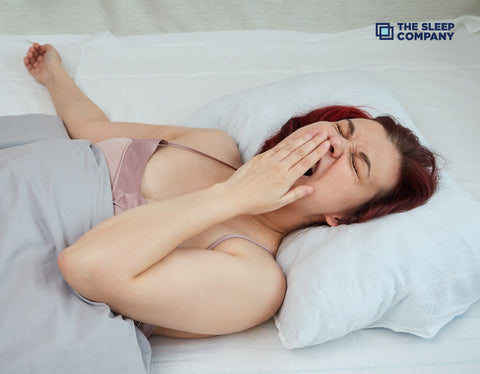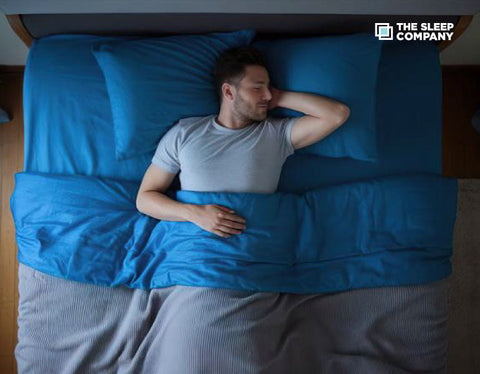My Cart
5 Signs You Need a Sleep Tracker
How many cups of coffee do you down as soon as you wake up? Or maybe tossing and turning for hours has become the norm? Perhaps staying alert and focused seems like an alien concept.
Well, let's tell you right away, if you have been struggling with sleep or staying awake and productive, it's not healthy. So, the very first step is figuring out every nuance about your slumber.
This is where a sleep tracker comes into the picture.
A sleep tracker can provide all the related data to understand if you are getting a good night's rest. It gives you deep insights into your sleep patterns, quality, and overall health.
While everyone can benefit from one, here are 5 signs that you are someone who really needs it.
What Is A Sleep Tracker?
As the name suggests, a sleep tracker is a device or an app that helps you take a deeper look into your sleep patterns and understand if you are getting the sleep you need.
Using a sleep tracker continuously can tell you how long you sleep, the quality of your sleep, and even provide insights on light, deep, and REM sleep stages. This data is crucial because knowing how much time is spent in each stage can help you check if your sleep quality is up to the mark.
Some trackers also check your heart rate, breathing, and movement during the night. Now, this information helps you see if you are getting uninterrupted rest and can guide you to improve your sleep habits for better health and energy.
Why Should You Monitor Your Sleep?

Here are some reasons why overseeing your sleep is a great idea.
1. It Helps You Understand Your Sleep Better
Sleep is not as straightforward as before. We live in a tech-driven mechanical era where stress is prominent and most of our time is spent on screens, whether television, computer, or phone. All this adversely affects sleep.
So, when you track your sleep, you get a clear picture of how well you rest each night. Robust sleep trackers record all the necessary data, such as how long you sleep, how often you wake up, time spent in each sleep stage, etc.
You are also able to see patterns or issues, such as difficulty falling asleep or frequent disturbances. This helps you make necessary changes so you get proper shuteye every night.
2. May Offer Personalized Insights
Sleep trackers not only tell you how much you have slept but can also offer deeper personalized insights. That's not all. They help you analyze your health.
For example, they help you understand your average heart rate throughout the night. This will give you an idea of your overall well-being. If something is not up to the mark, you can take the necessary steps to address and rectify them.
Some trackers even suggest changes to improve sleep quality, like going to bed earlier or reducing screen time before sleep. Personalized feedback helps you address specific challenges, such as difficulty staying asleep or feeling tired despite enough hours in bed.
3. Can Be Useful With Overall Health Monitoring
While they are known as sleep trackers, they do so much more. In fact, they can help you monitor your health better as well. These trackers can monitor your heart rate, breathing, and activity levels, which can provide a broader view of your health.
This data can alert you to potential problems, like irregular heart rhythms or stress affecting your sleep. Over time, these patterns can help prevent health issues or tell you about areas that need improvement.
5 Signs You Need a Sleep Tracker

Now let’s look at the top 5 signs that show you need a sleep tracker!
-
You Often Wake Up Feeling Tired Or Unrefreshed
Maybe you are someone who goes to bed on time and even falls asleep easily. But morning energy seems non-existent. If that's the case, a sleep tracker tells you if you get the quality sleep you need.
Sometimes, you may experience a variety of interruptions throughout the night or may spend too much time in light sleep stages rather than deep. All this prevents you from getting a good night's rest.
So, when you know the issue, you can make changes to rectify your sleep cycle. And a sleep tracker helps you with it.
-
You Struggle To Fall Asleep or Stay Asleep
Do you take time to fall asleep? Do minutes turn into hours, and still sleep seems nowhere to be found? The struggle is real, we know!
Sometimes, even when you go to bed early, you may find it difficult to fall asleep. And if you manage to do that, somehow, staying asleep may feel like an issue. Here, a sleep tracker can be exceptionally useful.
It can monitor your sleep onset, disturbances, and wake times, so you understand if there’s a pattern to your sleep difficulties. By tracking this information, you can pinpoint potential triggers and make changes.
-
You Suspect A Sleep Disorder
If you notice symptoms of a sleep disorder, such as sleep apnea or insomnia, a sleep tracker can be invaluable. This is because trackers monitor key metrics like breathing, heart rate, and movement, which can help detect irregularities.
For instance, if you undergo frequent periods of no breath or restless movements during sleep, it might indicate conditions like sleep apnea or restless leg syndrome.
With the help of this data, you can dig deep into your condition and consult a healthcare professional.
-
You Are Looking To Improve Your Fitness Levels
If you are planning to get fit, a sleep tracker can be perfect for you. When you understand your sleep patterns, you will know if you are getting enough deep sleep to promote muscle repair and recovery.
It can also tell you if poor sleep affects your energy or workouts. So, you can adjust your sleep routine better to support your fitness goals and enhance your overall well-being.
-
You Combat Inconsistent Sleep Schedule
We all have an internal clock known as circadian rhythm and an inconsistent sleep schedule can disrupt the same. So, if you often find yourself staying up late and waking up at different times, a sleep tracker can help you monitor and regulate your sleep habits.
When you fall asleep and wake up, the tracker can identify trends and help you stick to a more consistent sleep schedule. A stable routine is key for your body’s natural circadian rhythm.
Types Of Sleep Trackers You Can Try

There are three main types of trackers that you can try.
-
Mattress Sleep Tracker
Mattress sleep trackers are devices that can be placed under your mattress or pillows. They oversee your sleep patterns, heart rate, and more. The best part is that you don't have to wear these trackers. They track your movements easily as you snooze. It is perfect for those looking for non-intrusive options.
-
Wearable
Wearable trackers are those you wear as you snooze. These devices are your smartwatches, fitness bands, or rings. These trackers can keep an eye on your daytime activities as well.
-
Non-Wearable
Non-wearable trackers are those that can be placed beside your bed, such as apps. They use sensors or radar technology to monitor sleep patterns, breathing, and movement. Again, it is perfect for you if you don't like wearable devices.
How to Use a Sleep Tracker Effectively?
To ensure you use your sleep tracker correctly, make sure you follow the instructions as specified by the manufacturer. Next, use it consistently throughout the night, every night to track your sleep patterns.
Every week or 15 days once, review your sleep data, such as sleep stages and duration, and check for any disruptions. Also, pay attention to insights like heart rate or breathing irregularities. Finally, combine the data with a healthy bedtime routine.
What Are The Next Steps You Must Take?

Now that you have the necessary data to help you out, this is what you must do next.
1. Set Sleep Goals
As per the data, create achievable sleep goals so you get at least 7 to 9 hours each night. See what's interfering with your sleep and identify areas that need improvement.
2. Adjust Bedtime Routine
Make sure you create a bedtime routine that helps you relax and declutter the mind.
For instance, reduce screen time at least an hour before bed, take a warm bath, listen to soothing music, and do things that don't stimulate the mind too much. Keep the routine consistent so your mind and body get used to it.
3. Keep An Eye On Progress
Continuously use your sleep tracker and keep an eye on the progress. See if the changes you are making in your bedtime routine are helping you.
4. Invest In Quality Sleep Essentials
Something as simple as upgrading your mattress and pillows can sometimes help you achieve a good night's rest. So, see if your sleep environment is fetching you the comfort you deserve. If not, make the necessary tweaks.
The Final Note
Did the 5 signs resonate with you? If Yes, take this as your sign to invest in a robust sleep tracker that can help you achieve a good night's rest with ease.
The best sleep trackers are usually mattress-based as they are non-intrusive and solely designed to understand your sleep. They provide highly accurate insights and also don't burn a hole in your wallet. These trackers also keep you comfortable as you snooze and are a practical choice.
Keeping this in mind, The Sleep Company brings you the all-new SensAI Analyzer. At just 1 mm thin, it easily slides under the sheets, and you won't even feel a thing. The advanced technology offers you in-depth sleep and health metrics to optimize your overall well-being and slumber. And, the one-tap tracking app unpacks all the information you need in a hassle-free manner.
Perfect, isn’t it?
So, what are you waiting for? Analyze and upgrade your sleep quality today with SensAI!
FAQs
Here are all the top reasons why you need a sleep tracker:
Helps identify sleep disorders
Gives you insights into your sleep quality and patterns
Helps you understand sleep discrepancies
Makes it easy to maintain a sense of consistency
Gives you insights into your overall health
Helps monitor all metrics associated with sleep for a fitter you
If you are experiencing the below symptoms on a regular basis, chances are you need a sleep test or at least must speak to your doctor: Daytime fatigue, Loud snoring, Insomnia, Unexplained health issues, Restless sleep, Poor concentration.
As long as you are using a reputed sleep tracker, like the SensAI Analyzer from The Sleep Company, you have nothing to worry about.


































































